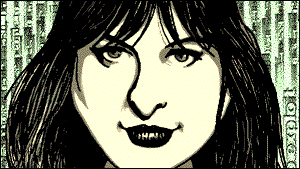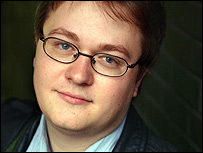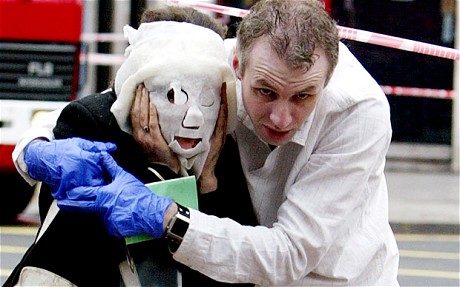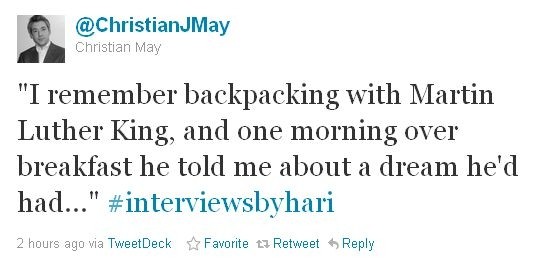Posts Tagged ‘Johann Hari’
Johann Hari leaves the Independent and may yet learn to be a journalist
 IOHANN Haris has left the Independent:
IOHANN Haris has left the Independent:
Johann Hari, the journalist at the Independent who was suspended for plagiarism, has announced that he will not return to the newspaper. Hari had been undergoing retraining in the United States and was expected to return to the Independent next month but said on his personal website that he did not want to see colleagues taking the blame for his mistakes.
It’s incredible that a journalist who cheated should be be wanted back at the paper, even at the Indy, which is not only the dullest read on the news shelf but spawned the i, a tabloid stripped of the hard-nosed opinion, humour and wit that make tabloids so popular.
Read the rest of this entry »
Chris Blackhurst fails to tell Leveson why Johann Hari’s lies are still on Independent website
 CHRIS Blackhurst, the Independent’s editor has made an appearance at the Leveson Inquiry into media standards. Talk turned to the Johann Hari – the Independent journalist who spiced up his copy with quotes from other sources and passed them off as his own work. Johann Hari also made things up, used the pseudonym David Rose to attack his critics and altered Wikipedia pages. His work won him prizes.
CHRIS Blackhurst, the Independent’s editor has made an appearance at the Leveson Inquiry into media standards. Talk turned to the Johann Hari – the Independent journalist who spiced up his copy with quotes from other sources and passed them off as his own work. Johann Hari also made things up, used the pseudonym David Rose to attack his critics and altered Wikipedia pages. His work won him prizes.
Blackhurst says the revelation that Hari was a cheat came as an “enormous shock“. He says the Independent’s standing had been “severely damaged“.
So damaged is the Indy that the Hari interviews remain visible on the paper’s website. They are uncorrected and with no word of apology.
After Hari had been exposed as a good writer but bad journalist, the Indy ran a front-page story back in June 2011:
“Johann Hari – What I think of the attacks on my professional integrity”
Not exactly a sorry, then. The Indy said Hari has been “subjected to trial by Twitter“. And we know how wrong that is.
The Guardian’s Jonathan Haynes wrote:
selling a paper on the basis of interest in a journalist’s dubious practices is an interesting move
Although, Hari has apologised.
Hari’s fraud was conniving. Guy Walters looked at one of Hari’s pieces: Johann Hari, The Independent, Hugo Chavez – An ‘Exclusive’ Interview, 14 May 2006
“I was in close contact with poverty, it’s true, I cried a lot…” – Lally Weymouth, Interview with Hugo Chavez in Newseek, October 2000
“I was in close contact with poverty, it’s true. I cried a lot.” – Johann Hari
“It is possible I have something of this . . . tragic sense of life,” he [Chavez] acknowledged. He recalled that on the eve of the 1992 rebellion he had said goodbye to his wife and three children, and led his soldiers out of their barracks. He was the last to leave. After locking the big front gate, he threw away the key. “I realized at that moment that I was saying goodbye to life,” Chávez said. “So it is possible that one has been a bit . . . imbued with that . . . ever since, no?” – Jon Lee Anderson, The New Yorker, The Revolutionary, 10 September 2001
The spectre haunting Latin America – the spectre of Hugo Chavez – furrows his big, broad brow, pats my knee, and tells me about the night he knew he was going to die. “I will never forget – in the early hours, I said goodbye to my wife and three little children. I kissed them goodbye and blessed them.” He knew in his gut he was not going to survive that long, bloody day in 1992, when he and his allies finally decided to stage a revolution against the old, rotten order loathed by the Venezuelan people. “I realized at that moment that I was saying goodbye to life,” he says, looking away. “So it is possible that, after surviving, one has been a bit… imbued with that sense ever since,no?” –
Get a load of that intimate pat on the knee.
As we wrote:
A newspaper ‘interview’ is nothing more than entertainment whether it’s in the Sun or Le Monde Diplomatique. The object of the exercise is to bring to vivid life an encounter of usually short duration. The good writer-interviewer, as the ruthless, opportunist carnivore he or she must be, will be alert for signs of weakness in the subject, ie for signs of entertainment material that makes a mockery of the PR or of the book/film/whatever that whorishly accounts for the interview in the first place.
If, say, a star interviewee-author coughs up blood and dies while boring the shit out of us on atheistic conformity in British journalism then there’s your money shot. Readers are not interested in ideas or lectures, not even godless ones. Alas, Hari imagines his role to be that of transcriber of great words – or great words obtained by others’ efforts if needs be. Reality check: any collection of his interviews will struggle to sell 500 copies (100 of those flogged to friends and relatives), eBook or otherwise.
When I’ve interviewed a writer, it’s quite common that they will express an idea or sentiment to me that they have expressed before in their writing – and, almost always, they’ve said it more clearly in writing than in speech. (I know I write much more clearly than I speak – whenever I read a transcript of what I’ve said, or it always seems less clear and more clotted. I think we’ve all had that sensation in one form or another).
So occasionally, at the point in the interview where the subject has expressed an idea, I’ve quoted the idea as they expressed it in writing, rather than how they expressed it in speech. It’s a way of making sure the reader understands the point that (say) Gideon Levy wants to make as clearly as possible, while retaining the directness of the interview. Since my interviews are intellectual portraits that I hope explain how a person thinks, it seemed the most thorough way of doing it…
Adding
It depends on whether you prefer the intellectual accuracy of describing their ideas in the most considered words, or the reportorial accuracy of describing their ideas in the words they used on that particular afternoon. Since my interviews are long intellectual profiles, not ones where I’m trying to ferret out a scoop or exclusive, I have, in the past, prioritised the former. That was, on reflection, a mistake, because it wasn’t clear to the reader.
Hari’s interview with Gideon Levy for the Independent in 2010 was a cheat. You can still read it on the Indy’s website. Brian Whelan fact checked Hari:
With a shake of the head, he says: “We had now two wars, the flotilla – it doesn’t seem that Israel has learned any lesson, and it doesn’t seem that Israel is paying any price. The Israelis don’t pay any price for the injustice of the occupation, so the occupation will never end. It will not end a moment before Israelis understand the connection between the occupation and the price they will be forced to pay. They will never shake it off on their own initiative.” – Hari, Independent 24/09/10;
These words first appeared in an article by Levy for Haaretz (http://www.haaretz.com/print-edition/opinion/israelis-don-t-pay-price-for-injustice-of-occupation-1.280237) on 19/07/09 without the dramatic ‘shake of the head’ (see “pat on knee” above”].
The Israelis don’t pay any price for the injustice of the occupation, so the occupation will never end. It will not end a moment before the Israelis understand the connection between the occupation and the price they will be forced to pay. They will never shake it off on their own initiative, and why should they?
Where I described their body language, for example, I was describing their body language as they made the same point that I was quoting – I was simply using the clearer words from their writing so the reader understood the point best.
He has, though, after ten years at the Independent and winning multiple journalism awards, learned an important lesson:
I now see it was wrong, and I wouldn’t do it again. Why? Because an interview is not just an essayistic representation of what a person thinks; it is a report on an encounter between the interviewer and the interviewee.
Where I described their body language, for example, I was describing their body language as they made the same point that I was quoting – I was simply using the clearer words from their writing so the reader understood the point best.
Adding:
I now see it was wrong, and I wouldn’t do it again. Why? Because an interview is not just an essayistic representation of what a person thinks; it is a report on an encounter between the interviewer and the interviewee.
Also in July, Hari spoke at a Royal Institution talk on free speech. Having made a name for hismelf, Hari should be in line for a career as a TV celebrity:
Spotter: Fleet Street Blues
Posted: 11th, January 2012 | In: Key Posts, Reviews | Comment (1)
Julie Burchill Leaves The Independent WIth A Swipe At Jemima Khan and Johann Hari
 JULIE Burchill has left the Independent.
JULIE Burchill has left the Independent.
Her final piece ends:
Give the people what they want, goes the old line, and that day is here at last for me and the vast majority of Independent readers as I write my final column. I leave you with a light heart, well aware that it’s time for me to move over. So I will now concentrate mainly on learning Hebrew and writing my memoir of philo-Semitism UNCHOSEN, with supplementary activity based around lunching, lazing and loafing. And the occasional foray into journalism, of course – I’d miss my trolls too much if I retired.
L’hitraot! as we say in Israel – be seeing you!
Read the rest of this entry »
Posted: 9th, November 2011 | In: Reviews | Comments (3)
Cynical Johann Hari Is The Celebrity Plagiarist: His Fame Keeps Him Working In The Profession He Cheapens
 AS I wrote on June 28, the fuss over columnist Johann Hari will do him no harm whatsoever. So I told you so. Many privately assured me that he would lose his job at the Independent but I knew better. Once you understand that newspaper editors are craven in the court of celebrity – even a micro-celebrity created by themselves or predecessors – it was rapidly deducible that a laundering formula would be found to retain Hari’s services which did not include the words ‘You’re fired!’
AS I wrote on June 28, the fuss over columnist Johann Hari will do him no harm whatsoever. So I told you so. Many privately assured me that he would lose his job at the Independent but I knew better. Once you understand that newspaper editors are craven in the court of celebrity – even a micro-celebrity created by themselves or predecessors – it was rapidly deducible that a laundering formula would be found to retain Hari’s services which did not include the words ‘You’re fired!’
What impresses me most is that Hari has clearly paid attention to Madame Arcati. In my piece (linked above), I lectured that a celeb interview is an ‘encounter’ not an ‘intellectual portrait’ as he self-servingly put it: so, in yesterday’s apology, what word does he use to display his new wisdom and describe a celebrity interview? ‘Encounter’. He learns fast. No wonder he’s good at exams.
Read the rest of this entry »
Will Johann Hari Lose His Snotty Orwell Prize Ranking For Arty Politics?
 INDEPENDENT columnist Johann Hari confesses to passing of quotes gathered elsewhere as his own work. Will such creativity casue him to lose his ranking in the Orwell Prize for top journalism?
INDEPENDENT columnist Johann Hari confesses to passing of quotes gathered elsewhere as his own work. Will such creativity casue him to lose his ranking in the Orwell Prize for top journalism?
Maybe.
Something called The Council of the Orwell Prize – is that itself Orwellian? – has issued a statement:
The Council of the Orwell Prize met on Thursday 21st July to consider Johann Hari’s 2008 submission for the journalism prize.
After extensive deliberation, the Council arrived at a clear and unanimous decision, which drew from the combined journalistic and academic expertise of its members.
Read the rest of this entry »
Phone Hacking: Madeleine McCann And Johann Hari Used To Bash News Of The World And Lying Labour
 PHONE hacking: The Mail and Telegraph lead with news that families of soldiers killed in battle might have had their phones hacked.If true, Anorak has one questions: why?
PHONE hacking: The Mail and Telegraph lead with news that families of soldiers killed in battle might have had their phones hacked.If true, Anorak has one questions: why?
The News of The World has been accused of intercepting voicemails left on the phones of murdered schoolgirl Milly Dowler, the parents of murdered schoolgirls Holly Wells and Jessica Chapman and families of victims of the 7/7 attacks. Were the police complicit in this snooping – happy for the media to do the dirty work?
We don’t mind much when the paper snoops on the rich and famous – but when they spy on us we blanche. (Although, of course, the Government and big business do the all the time – and where’s the protest? Read here.)
In the Telegraph former Tory polecat Lord Norman Tebbitt says that the Left-leaning journalists are not so clean – like Independent columnist Johann Hari:
There can be no excuses for what was done by investigators or journalists in the pay of editorial executives at The News Of The World. However, it would take a strong stomach not to be revolted at the smug, self satisfied journalists of the Left, who were ready with excuses for one of their kind recently uncovered as having regularly stolen the work of other writers and made a living by passing it off as his own, but are writhing with delight at the exposure, humiliation and possible downfall of their enemies in the far more popular and successful Murdoch press.
Read the rest of this entry »
Posted: 7th, July 2011 | In: Reviews | Comments (4)
Johann Hari’s Plagiarism Confession Will Make Him A Media Darling
 SOMEONE called Johann Hari, a columnist on the UK Independent and a gadabout for various other up-there publications, has confessed to lifting quotes to beef up his celebrity interviews. If his star subject is not making much sense, Hari will pinch a better quote on the point-in-hand, truffled from the written work of the interviewee (uncredited), and pass it off as part of his own splendid cross-exam. Naughty!
SOMEONE called Johann Hari, a columnist on the UK Independent and a gadabout for various other up-there publications, has confessed to lifting quotes to beef up his celebrity interviews. If his star subject is not making much sense, Hari will pinch a better quote on the point-in-hand, truffled from the written work of the interviewee (uncredited), and pass it off as part of his own splendid cross-exam. Naughty!
Blogger scorn and fainting have greeted this confession: why, it’s even trending on Twitter as I write.
Read the rest of this entry »
Posted: 29th, June 2011 | In: Key Posts | Comment (1)
Why We Must Pay More For The Biased BBC
 THE BBC does much good, and much indifferent or bad. But does that make it different to any other broadcaster? Here are two views on the huge corporation that stymies media competition and that if you want to watch telly legally in the UK you have to fund:
THE BBC does much good, and much indifferent or bad. But does that make it different to any other broadcaster? Here are two views on the huge corporation that stymies media competition and that if you want to watch telly legally in the UK you have to fund:
Let’s start with the good news. The BBC works. For just £2.60 a week, the British get a package of the best television and radio in the world. We get the best comedies, the best drama and the best news. There’s a reason why we have won seven of the past 10 international Emmies, and the BBC News website is the most popular on earth. As soon as he took power, Nicolas Sarkozy asked how he could make French broadcasting more like ours. It is a model for the world of how to create journalism that isn’t contaminated by either corporate advertisers and proprietors on one side, or state ownership on the other. Three independent polls have found that a large majority of Brits would happily pay more for it.
Read the rest of this entry »
2013 And The Climate Crunch Will Squash Us All
IT’S not when the ice will melt and drown us all that triggers any debate, but why we are being made to wait so long for the big flood.
The Indy’s Johann Hari looks into this crystal ball:
We are living through two great meltdowns – the credit crunch, and the climate crunch. The heating of the planet is now happening so fast it’s hard to pluck a single event to fix on, but here’s one. By the summer of 2013, the Arctic will be free of ice. How big an event it [sic] this?
Climate crunch…
Read the rest of this entry »


